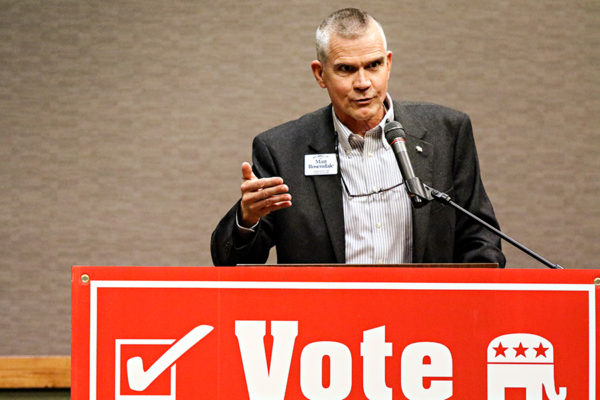Congressional Candidates Double Down on Bid for Montana’s Lone House Seat
Democrat Kathleen Williams takes second swing at Montana’s at-large seat, while State Auditor Matt Rosendale campaigns on Trump loyalty
By Tristan Scott
The only campaign Kathleen Williams has ever lost may prove to be the smartest one she’s ever run, occurring as it did during a midterm election year that a global pandemic hadn’t yet deprived of oxygen.
Unlike her current bid for the U.S. House of Representatives, which has been more subdued since March due to public health concerns over holding large political rallies, the Bozeman Democrat’s highly visible 2018 campaign saw her cover more than 40,000 miles of Montana roadway in her hybrid car, hobnobbing with voters in the Flathead Valley and in far-flung towns like Troy and Eureka during her tours of deeply conservative Northwest Montana.
Even though Williams ultimately lost that high-dollar race to Republican U.S. Rep. Greg Gianforte, she finished with 46.2% of the vote, making it the best finish by a Democrat since former Rep. Pat Williams was re-elected in 1994. She also set a fundraising record for a Montana Democrat running for U.S. House and built a surplus of name recognition along the way — momentum that has carried into the 2020 election.
Still, that doesn’t soften the sting of losing.
“It’s hard to describe my disappointment after that loss, not because I’m a sore loser but because the consequences of that loss have meant a lack of leadership and representation for Montanans,” the former three-term state legislator said.
But if 2018 propped up Williams as a formidable contender with a familiar name on the 2020 ticket, it did the same for her Republican opponent.

Matt Rosendale, a Glendive-area landowner serving as the state auditor since 2016, hopes to reap the benefits from his highly visible 2018 campaign to unseat U.S. Sen. Jon Tester, which was ultimately unsuccessful despite four visits to the Treasure State by President Trump, who campaigned on behalf of a slate of Republican candidates, including Rosendale.
He continues to draw on his relationship with Trump as a highlight of his campaign — his website showcases a photograph of himself standing onstage with the president during a campaign event, and he frequently touts his relationship with Trump as a reason voters should support him.
“I’ve got the president’s ear, he’s got my back, and that’s what people are looking for,” Rosendale said.
Even as criticism of Trump’s handling of the coronavirus outbreak mounts, Rosendale says his inroads with the Oval Office give him leverage in advancing policies should the president win re-election, including repealing the 2010 Affordable Care Act, or Obamacare.
Rosendale said he supports repealing Obamacare and that he’d concentrate on growing a robust health insurance market to lower costs and improve Montanans’ health care choices, saying his record as the state’s insurance commissioner reflects that dedication.
“Voters can look at my past actions to judge my future performance,” he said, adding that he supports the president’s response to the pandemic, including his decision to roll back federal regulations aimed at curbing the outbreak, but which slowed economic recovery.
Williams said health care has been by far the most frequent topic of concern voiced by constituents from all corners of the state, and she has advocated for Medicare buy-ins for people over the age of 55.
Williams also has a record to lean on, one that she honed both as a three-term state legislator and during a decades-long career in natural resource planning and policy. As one of Montana’s leading experts on water rights, Williams said she “crafted and negotiated creative, win-win solutions to manage the lakes, streams, fisheries, and lands that make Montana the Last Best Place.”
“I spent more than 30 years fighting for our outdoor heritage, while Matt Rosendale has advocated for the transfer and sale of our public lands,” she said.
Rosendale did support the transfer of some federal lands to state management during his 2014 run for the U.S. House, a bid he lost to primary opponent Ryan Zinke, though he’s since reversed course on the issue.
“He finally talked to some folks and decided that might not be such a good idea, but I have not wavered in my support of keeping public lands in public hands,” Williams said.
Both candidates have demonstrated their support of the Second Amendment in their campaign ads, though Williams said she supports closing loopholes in background checks on gun purchases, prompting an F rating from the National Rifle Association, which endorsed Rosendale.
As a member of the State Land Board, Rosendale said he’s heard from Montanans about their opposition to federal land transfers and vowed to stand up in the fight, adding that his oversight of school trust lands has helped improve access for hunters and anglers.
“The people of Montana have made it very clear that they oppose a federal lands transfer, and I completely agree,” Rosendale said.
On tax policy, the candidates have drawn stark contrasts, with Rosendale pledging support for making permanent the 2017 federal tax cuts by Republicans that reduced the corporate tax rate from 35% to 21% — a policy Williams says is skewed to benefit the wealthy.
Even as Rosendale casts Williams as an acolyte of the “far-left,” she’s vowed to break up the hyper-partisan gridlock of Washington, billing herself as a “bridge builder.”
“Four years ago I really started to realize that’s where I needed to focus my energy at the national level,” Williams said. “A lot of Montanans are frustrated with the lack of civility in Washington, and I think I can help.”
“People ask me if I’m a progressive or a moderate and I always say ‘Yes’,” she added. “My background is unique for someone with a ‘D’ next to her name.”
She’s also seeking to do what no woman has done in nearly 80 years, since Jeanette Rankin began her second congressional term as Montana’s lone representative in Congress in 1941, which is the last time Montana elected a woman to federal office.